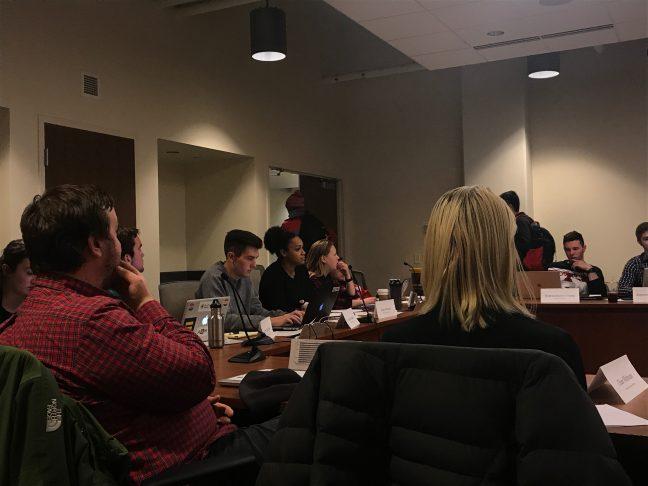University of Wisconsin students attended an Associated Students of Madison open forum Tuesday to extensively discuss a privately funded trip to Israel that many ASM members are taking part in.
The trip, which was offered to nearly 200 student leaders and campus organizations, is funded by UW Hillel, a private non-university affiliated organization. All students could have applied to the trip, though it was only sent out through UW Hillel associated communications, ASM outreach director Yogev Ben-Yitschak said.
The trip was not ASM funded, but some members of the council, including press office director Courtney Morrison, were asked to apply.
.@asmstudentgovt is currently being questioned by open forum attendees about council members’ trip to Israel, which is being offered through @UWHillel https://t.co/uOhBkBKDhl
— The Badger Herald (@BadgerHerald) December 6, 2017
“I’m not a voting member and I was asked to apply to the trip by not only a member of ASM but also two members outside of ASM,” Morrison said.
That raised many concerns from open forum attendees who said the trip wasn’t announced publicly to all students.
UW senior Omar Jandal, a Palestinian student, said it’s problematic that non-Palestinian students have the privilege of going to Israel while citizens of the state aren’t granted that right.
“You are meant to represent students — whether it be one student in UW population or 2,000 students,” Jandal said. “How many Palestinians were involved in planning this trip?”
There were numerous students and student organizations that could’ve been contacted to be involved in the planning of the trip, Jandal said.
.@BadgerHerald Representatives from Native American student organization Wunk Sheek stand in solidarity with Palestinian students, say racial minorities in the United States have similar experiences
— Pey David (@peydavid44) December 6, 2017
Moreover, UW sophomore Zahiah Hammad, co-president of Students for Justice in Palestine, said students who go on the trip won’t see the realities of life for Palestinian citizens.
But some ASM members refuted the claim that their status as council members should limit their capacity to go on the trip.
Rep. Sean Bielmeier, who isn’t a member going on the trip, said ASM members are still individuals and they should still have a choice over what they do.
“Yes, while the members who are maybe going are members of ASM, they are also individuals who can further their own knowledge in ways that they choose to pursue,” Bielmeier said.
The upcoming trip comes approximately eight months after the contentious divestment resolution which passed following fierce opposition from Jewish and Israeli students last spring but was ultimately rejected by the university administration.
Also at Tuesday’s meeting, a new Legislative Affairs Committee chair was elected. The committee advocates for the interests of UW students at varying levels of governments.
The two nominees for the position were Malcolm Stern and Legislative Affairs Vice Chair Sydney Scott.
Stern advocated for focusing on lobbying the city and county governments, areas where he believes the committee can have more of a tangible impact.
Scott, however, ran on the position that lobbying the state Legislature is most important, a belief which has largely been shared during the tenure of outgoing committee chair Kat Kerwin.
Scott won the election in 14-13-0 vote, with ASM Chair Katrina Morrison breaking the tie vote. Scott will begin her tenure as chair of the Legislative Affairs Committee at the start of the spring semester.
Ray Cross, president of the UW System, also engaged in a question-and-answer session with ASM representatives. He addressed the controversial Board of Regents free speech policy and the proposed restructuring of 13 UW system schools into seven four-year institutions.
In addressing the restructuring of UW system schools, Cross said three alternative measures were considered before reaching the final decision to integrate the two-year campuses into four-year institutions.
These measures included closing at least three campuses that were struggling the most, merging two-year campuses with area technical colleges or doing nothing.
None of these measures were taken very seriously during the deliberation process, and Cross expressed confidence in the decided proposal.
Additionally, Cross discussed the controversial free speech bill which was passed by the Board of Regents earlier this year. Per the policy, students found to disrupt the free expression of others on more than one occasion could be subject to suspension and, ultimately, expulsion.
Many students have expressed opposition to the policy, finding its language too vague and mandatory disciplinary guidelines to be too restrictive of students’ ability to protest.
Cross said while the concerns over the vagueness of what constitutes disruption are legitimate, he does not believe the policy will have a chilling effect on speech and protest on UW campuses.
“The perception is that this will stifle freedom of speech,” Cross said. “I don’t think it will.”
Cross emphasized students retain the power to protest speakers they disagree with on campus, but said protest must not restrict the ability of someone else to deliver a speech or express themselves freely.
Finally, ASM addressed the growing national discussion around net neutrality, a current governing principle which guarantees primarily free and unrestricted access to the Internet for all users.
The motion, spearheaded by Rep. Jeremy Swanson, called for ASM’s public support of net neutrality. The motion passed unanimously.
“This has a disproportionate impact on institutions of higher education and students, who use the Internet quite frequently,” Swanson said. “The vast majority of students want to see net neutrality continue.”
ASM’s next meeting will be held on Jan. 23, at the start of the spring 2018 semester.
____
Correction: A previous version of this article stated the trip was offered to only 30 students. The article has since been updated to reflect the fact that information about the trip was sent to nearly 200 student leaders and campus organizations that were asked to it share with their membership. The Badger Herald regrets this error.


